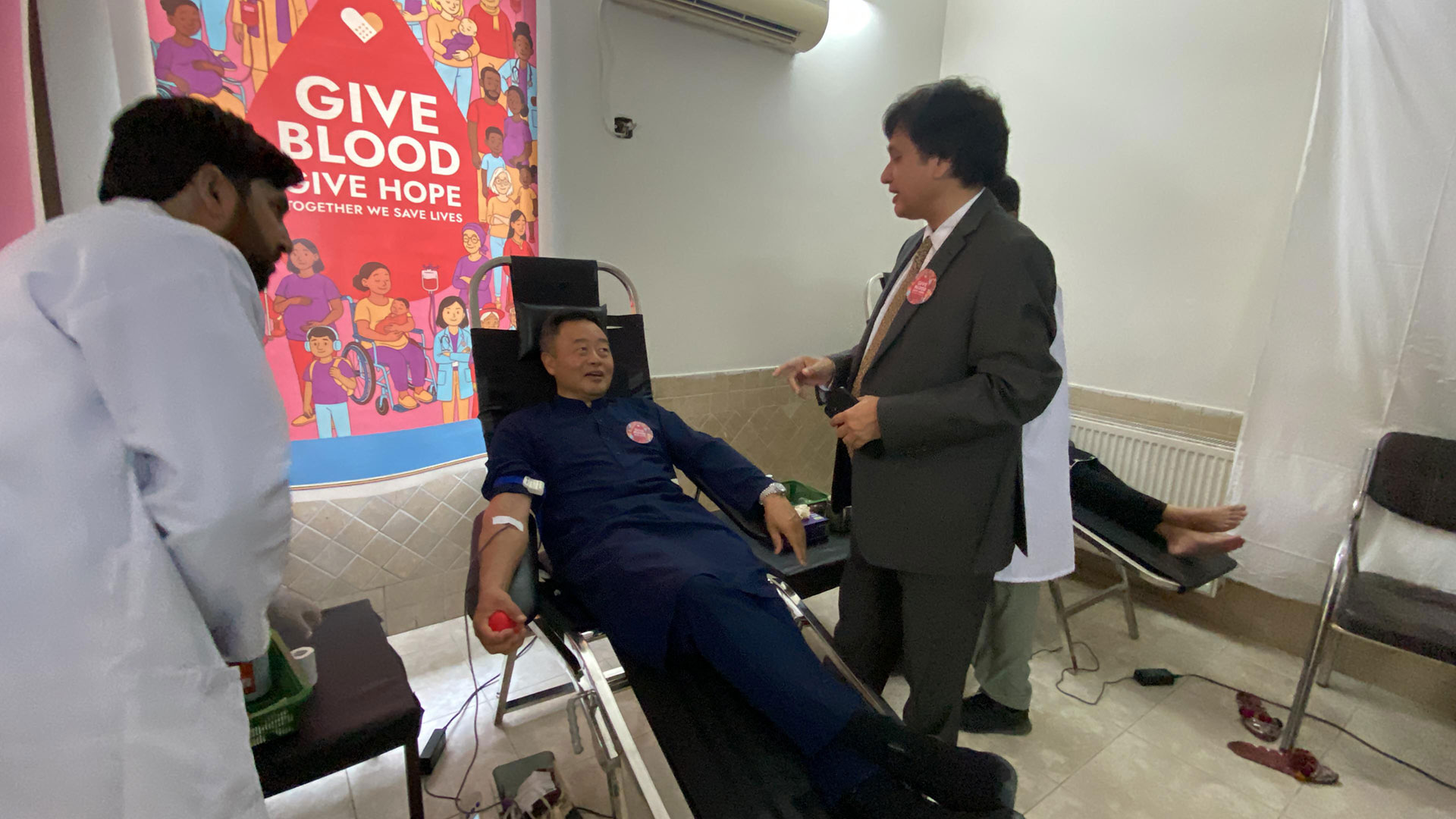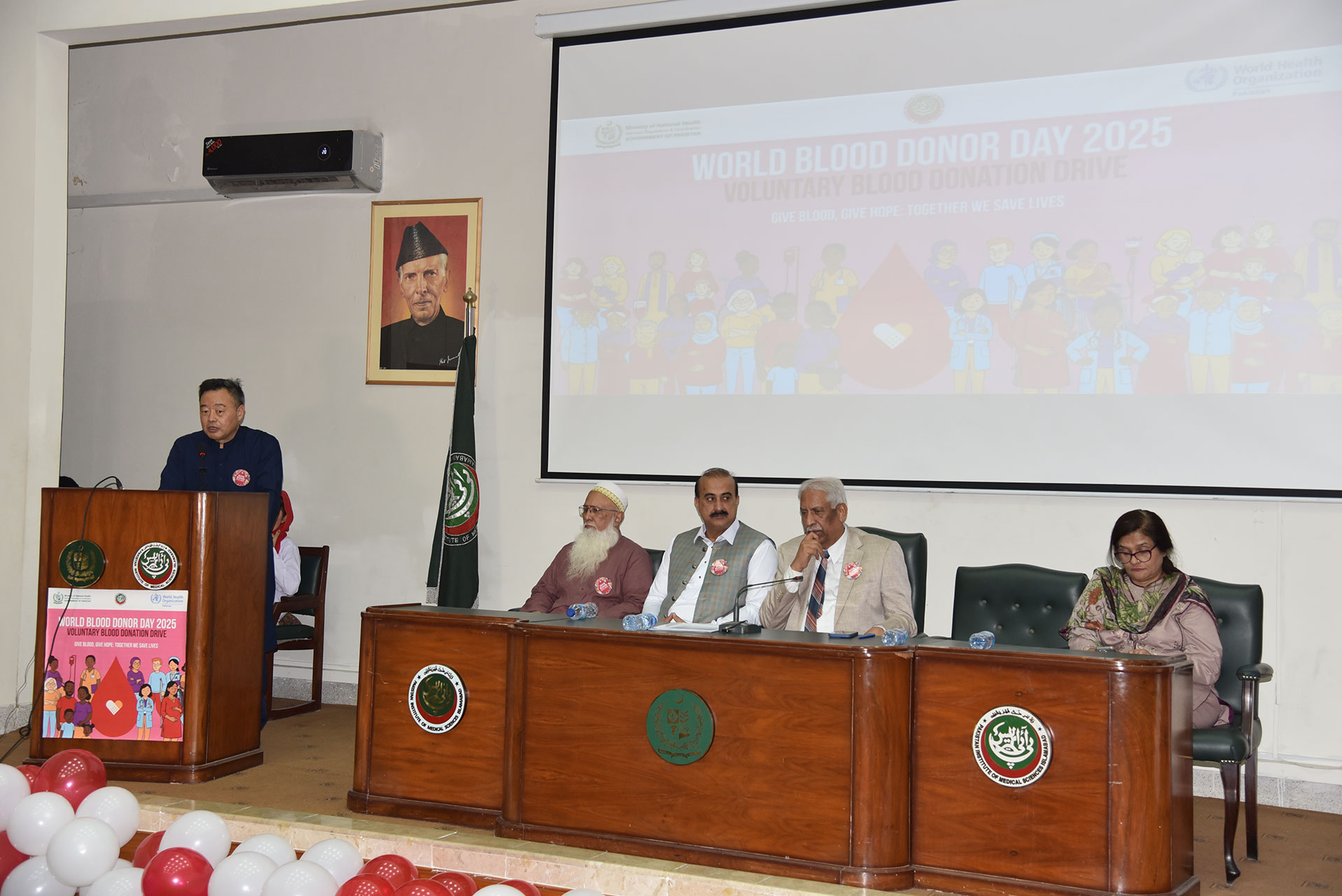 WHO Representative in Pakistan Dr Dapeng Luo donates blood during an event organized at the Pakistan Institute of Medical Sciences to commemorate World Blood Donor Day. Photo credit: Maryam Yunus/WHO23 June 2025, Islamabad, Pakistan – On the occasion of World Blood Donor Day, the World Health Organization (WHO) and Pakistan’s Ministry of Health joined hands in calling on people to urgently donate blood voluntarily to address a deficit that is severely limiting the ability of hospitals to save lives. Medical centres in Pakistan need over 5 million blood donations annually and will require 5.6 million by 2030. Currently, they receive around 2.3 million donations a year.
WHO Representative in Pakistan Dr Dapeng Luo donates blood during an event organized at the Pakistan Institute of Medical Sciences to commemorate World Blood Donor Day. Photo credit: Maryam Yunus/WHO23 June 2025, Islamabad, Pakistan – On the occasion of World Blood Donor Day, the World Health Organization (WHO) and Pakistan’s Ministry of Health joined hands in calling on people to urgently donate blood voluntarily to address a deficit that is severely limiting the ability of hospitals to save lives. Medical centres in Pakistan need over 5 million blood donations annually and will require 5.6 million by 2030. Currently, they receive around 2.3 million donations a year.
Under the international theme ‘Give blood, give hope – together we save lives’, nearly 150 volunteers participated in a blood drive organized by the Pakistan Institute of Medical Sciences (PIMS) in collaboration with WHO. One of the first volunteers to donate blood was WHO Representative in Pakistan Dr Dapeng Luo.
“Every patient who needs blood should be able to receive it. WHO will continue to work with Pakistan to strengthen a blood service that promotes voluntary donations and gives patients access to safe blood and blood products in sufficient quantity, as a key component of an effective health system. Voluntary blood donations can save lives and give hope to those in need. With a single donation, each of us can save up to 3 lives,” said Dr Luo.
 WHO Representative in Pakistan Dr Dapeng Luo speaks during the commemoration of World Blood Donor Day. Photo credit: Maryam Yunus/WHO Around 1.9 million of the 2.3 million annual blood donations in Pakistan (82%) come from family or replacement donors. Voluntary, non-remunerated blood donations account for just 18% of the total.
WHO Representative in Pakistan Dr Dapeng Luo speaks during the commemoration of World Blood Donor Day. Photo credit: Maryam Yunus/WHO Around 1.9 million of the 2.3 million annual blood donations in Pakistan (82%) come from family or replacement donors. Voluntary, non-remunerated blood donations account for just 18% of the total.
Voluntary blood donations are the safest and most sustainable source of blood. Voluntary donors are less likely to transmit infectious diseases and contribute to building systems in which every patient has access to safe blood regardless of their income or social status.
“The real heroes are those who donate blood without any hesitation. It is a very noble cause,” said Dr Nelson Azeem, Parliamentary Secretary, Ministry of National Health Services, Regulations and Coordination.
“Giving blood is giving life, and together we can do this. We are in the phase of revitalizing the Regional Blood Transfusion Centre. I appreciate the effort of WHO and the technical support being provided. Their continuous support will ultimately result in proper screening and proper testing,” said Director General Health Dr Shabana Saleem.
WHO stands with Pakistan as it works to reinforce the country’s blood banks and use standardized blood screening methods and protocols to ensure safe and adequate blood supplies for all, leaving no one behind.
For additional information, please contact:
Maryam Yunus, National Professional Officer – Communications, WHO Pakistan, This e-mail address is being protected from spambots. You need JavaScript enabled to view it (copying This e-mail address is being protected from spambots. You need JavaScript enabled to view it )
José Ignacio Martín Galán, Head of Communications, WHO Pakistan, This e-mail address is being protected from spambots. You need JavaScript enabled to view it
About WHO
Founded in 1948, WHO is the United Nations agency that connects nations, partners, and people to promote health, keep the world safe and serve the vulnerable. We work with 194 Member States in 150+ locations – so everyone, everywhere, can attain the highest level of health. For more information, visit https://www.emro.who.int/countries/pak/index.html. Follow WHO Pakistan on Twitter and Facebook.




